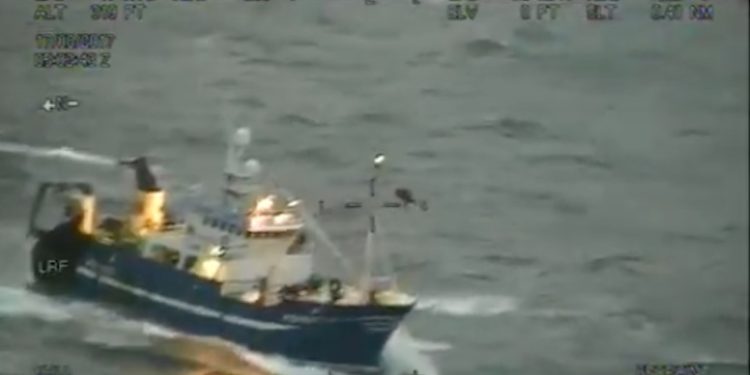A crewman became unwell on a fishing vessel over 200 miles from Stornoway, his condition serious enough to require urgent medical attention. The UK Coastguard sent two search and rescue helicopters, one from Inverness and one from Stornoway, to the scene off west of Scotland.
With the Inverness helicopter in the top cover support role, Stornoway’s helicopter flew to the vessel and winched the man on board in deteriorating weather conditions. The casualty was then flown back to Benbecula Airport and from there to Aberdeen Royal Infirmary for further treatment.
‘As is often the case with rescues a significant distance out to sea, the weather presented a substantial challenge. The sea state was rough to very rough, resulting in the fishing vessel suffering considerable heave, pitch and roll, which made the winching difficult,’ said Captain Andy Pilliner who piloted the Stornoway Coastguard helicopter.
‘The vessel did all it could to help make the transfer as safe as possible, steering a course to minimise the effects of the sea, while volunteers from the crew grappled with a heaving-in line to attempt to stabilise the winchman and casualty. Nevertheless, it was a challenging winch that went well given the conditions of the deck.’
‘We were reassured to have our colleagues from the Inverness SAR unit providing us with support in case we needed it. Thankfully, everything went to plan, and the Inverness crew were able to complete the rescue by transferring the casualty to hospital in Aberdeen. Together with the support of the UK Aeronautical Rescue Coordination Centre (ARCC) this was a great result of the teamwork between all the units involved,’ he said.
The extreme range, strong headwinds and very rough seas required additional planning and co-ordination with the ARCC playing a pivotal role,’ commented Captain Simon Hammock who piloted the Inverness Coastguard helicopter said. ‘The plan worked well and while it was good to have assisted, it was the crew of Stornoway Rescue 948 who did all the hard work on scene.
‘We often talk about the importance of team work in search and rescue,’ said Jonathan Mustard, Aeronautical Operations Controller for UK Coastguard ARCC.
‘Owing to the long range, it was vital the helicopters were able to rendezvous with the vessel and evacuate the injured crewman with as little delay as possible. This is a superb example of two HM Coastguard search and rescue helicopters working closely together. We would like to thank all those who have played their part in bringing this rescue to a successful conclusion. Our priority is to protect life at sea and we will always do everything possible to provide assistance for a mariner in need. Thankfully, we have been able to get him to hospital and we hope he is on the road to recovery.’









